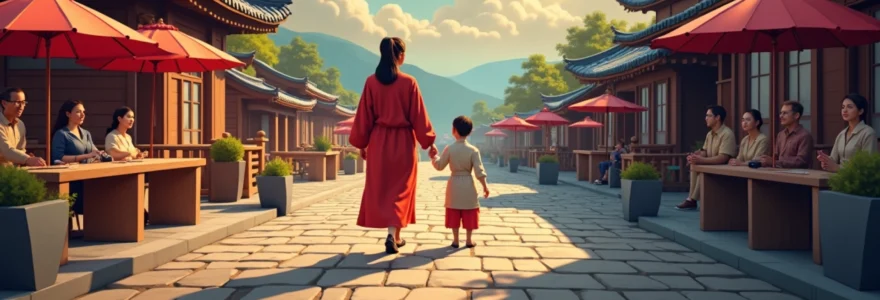Travel has the power to transform, educate, and inspire. When we venture beyond our familiar surroundings, we open ourselves to a world of diverse cultures, traditions, and perspectives. Exploring different cultures not only broadens our horizons but also enriches our travel experiences in profound ways. It allows us to forge deeper connections, gain new insights, and develop a more nuanced understanding of the world around us.
Cultural exploration goes beyond mere sightseeing; it involves immersing oneself in the local way of life, engaging with communities, and embracing unfamiliar customs. This approach to travel can lead to personal growth, enhanced empathy, and a greater appreciation for the rich tapestry of human experiences. By stepping out of our comfort zones and embracing cultural diversity, we open ourselves to transformative experiences that can shape our worldviews and leave lasting impressions.
Cultural immersion techniques for authentic travel experiences
To truly enrich your travel experiences through cultural exploration, it’s essential to employ effective immersion techniques. These methods allow you to delve deeper into the local culture and gain authentic insights that go beyond surface-level observations. One powerful approach is to engage in participatory tourism , where you actively take part in local activities, traditions, and daily life.
Consider staying with local families through homestay programmes, which offer a unique opportunity to experience everyday life in your destination. This approach allows you to observe and participate in family routines, share meals, and engage in meaningful conversations that provide valuable cultural insights. Additionally, volunteering for community projects or attending local workshops can help you connect with residents and contribute positively to the places you visit.
Another effective technique is to seek out off-the-beaten-path experiences that expose you to lesser-known aspects of the local culture. Explore neighbourhoods away from tourist hotspots, visit local markets, or attend community events to gain a more authentic perspective. By venturing beyond the typical tourist attractions, you’ll discover hidden gems and encounter local customs that may not be featured in guidebooks.
Anthropological approaches to cross-cultural interactions
Adopting anthropological approaches to cross-cultural interactions can significantly enhance your cultural exploration experiences. These methods, derived from the field of anthropology, provide a structured framework for observing, analysing, and interpreting different cultures. By applying these techniques, travellers can gain deeper insights into the societies they encounter and develop a more nuanced understanding of cultural differences.
Participant observation in local communities
Participant observation is a key anthropological technique that involves immersing oneself in a community to gain firsthand experience of their way of life. As a traveller, you can apply this method by actively participating in local activities, rituals, or daily routines. This could involve joining a community gathering, assisting with agricultural tasks, or taking part in traditional crafts workshops.
By engaging in participant observation, you not only gain valuable insights into the community’s customs and values but also build meaningful relationships with locals. This approach allows you to experience the culture from an insider’s perspective, fostering a deeper appreciation for the nuances of local life.
Ethnographic interviewing methods for travellers
Ethnographic interviewing is another valuable tool for cultural exploration. This technique involves conducting in-depth, open-ended conversations with locals to understand their perspectives, beliefs, and experiences. As a traveller, you can adapt this method by engaging in thoughtful discussions with people you meet during your journey.
When practising ethnographic interviewing, it’s important to approach conversations with genuine curiosity and respect. Ask open-ended questions that encourage detailed responses, and be prepared to listen actively. This method can provide rich, qualitative data about the culture you’re exploring, offering insights that may not be apparent through observation alone.
Analysing cultural symbols and rituals during travels
Cultural symbols and rituals play a significant role in shaping societal values and beliefs. As you explore different cultures, pay close attention to the symbols, ceremonies, and rituals you encounter. These may include religious practices, traditional dress, art forms, or social customs.
By analysing these elements, you can gain a deeper understanding of the culture’s history, values, and worldview. Look for patterns and meanings behind the symbols and rituals you observe. Consider how they relate to the broader cultural context and what they reveal about the society’s beliefs and priorities.
Applying cultural relativism in unfamiliar settings
Cultural relativism is a crucial concept in anthropology that encourages understanding cultural practices within their own context rather than judging them based on one’s own cultural standards. As a traveller, adopting this perspective can help you navigate unfamiliar settings with greater empathy and open-mindedness.
When encountering customs or behaviours that seem unusual or challenging, try to suspend judgment and instead seek to understand the underlying cultural logic. This approach can lead to more meaningful cross-cultural interactions and a richer appreciation for diverse ways of life.
Culinary exploration as a window into cultural diversity
Food is an integral part of any culture, reflecting its history, geography, and social values. Culinary exploration offers a delicious and engaging way to immerse yourself in different cultures. By sampling local cuisines, participating in cooking classes, and learning about traditional ingredients and preparation methods, you can gain valuable insights into a society’s customs, beliefs, and way of life.
Exploring local food markets is an excellent starting point for culinary adventures. These vibrant hubs of activity offer a glimpse into everyday life and showcase the ingredients that form the foundation of local cuisine. Engage with vendors, ask questions about unfamiliar produce, and observe how locals interact and make their purchases.
Street food tours in bangkok’s yaowarat road
Bangkok’s Yaowarat Road, the heart of the city’s Chinatown, is renowned for its bustling street food scene. Taking a guided street food tour in this area can provide a fascinating insight into Thai-Chinese culinary traditions. As you sample dishes like pad thai , moo ping (grilled pork skewers), and khanom buang (crispy pancakes), you’ll learn about the historical and cultural influences that have shaped this unique cuisine.
These tours often include visits to local shrines and explanations of Chinese-Thai traditions, offering a holistic view of the community’s cultural heritage. The experience of navigating crowded streets, interacting with vendors, and sharing meals with fellow travellers can deepen your understanding of Bangkok’s vibrant food culture.
Traditional cooking classes in tuscany’s agriturismo
Participating in a cooking class at a Tuscan agriturismo (farm stay) offers a hands-on way to explore Italian culinary traditions. These classes typically focus on regional specialities and often include a visit to local markets or farms to source ingredients. As you learn to prepare dishes like handmade pasta, ribollita (Tuscan bread soup), or bistecca alla fiorentina , you’ll gain insights into the importance of seasonal, local ingredients in Italian cuisine.
The agriturismo setting also provides an opportunity to learn about sustainable farming practices and the role of agriculture in Tuscan culture. Sharing a meal with your hosts and fellow participants allows for cultural exchange and fosters a deeper appreciation for the social aspects of Italian dining traditions.
Wine tasting experiences in france’s bordeaux region
Wine plays a central role in French culture, and nowhere is this more evident than in the Bordeaux region. A wine tasting experience in Bordeaux offers more than just an opportunity to sample world-renowned wines; it provides insights into French history, terroir, and winemaking traditions that have been passed down through generations.
Visiting vineyards and châteaux allows you to observe the winemaking process firsthand and learn about the intricate classification system that governs Bordeaux wines. Engaging with sommeliers and winemakers can deepen your understanding of the cultural significance of wine in French society and its role in social interactions and celebrations.
Participating in japanese tea ceremonies in kyoto
The Japanese tea ceremony, known as chanoyu or sadō , is a highly ritualized practice that embodies many aspects of traditional Japanese culture. Participating in a tea ceremony in Kyoto, the cultural heart of Japan, offers a unique window into Japanese aesthetics, philosophy, and social etiquette.
During the ceremony, you’ll learn about the precise movements and gestures involved in preparing and serving matcha tea. The experience often includes explanations of the symbolic meanings behind various elements of the ceremony, such as the tea utensils, the arrangement of the tea room, and the seasonal themes reflected in the decoration. This immersive cultural experience can foster a deeper appreciation for Japanese concepts of harmony, respect, purity, and tranquillity.
Language acquisition strategies for deeper cultural connections
Learning the local language, even at a basic level, can significantly enhance your cultural exploration experiences. Language is not just a means of communication; it’s a gateway to understanding a culture’s worldview, humour, and social norms. By making an effort to speak the local language, you demonstrate respect for the culture and often receive a warmer welcome from locals.
Start by learning essential phrases and greetings before your trip. Apps like Duolingo or Babbel can be helpful for basic language acquisition. Once at your destination, challenge yourself to use the local language as much as possible, even if you make mistakes. Many travellers find that locals appreciate the effort and are often willing to help you improve.
Consider enrolling in short-term language courses at your destination. These classes often combine language instruction with cultural activities, providing a comprehensive learning experience. Additionally, language exchange meetups or conversation groups can offer opportunities to practice with locals while fostering cultural exchange.
Cultural festivals and events as immersive learning experiences
Attending cultural festivals and events can provide some of the most immersive and memorable experiences for travellers seeking to explore different cultures. These celebrations offer a concentrated dose of cultural traditions, often showcasing music, dance, food, and rituals that may not be easily observable in everyday life.
Participating in india’s holi festival celebrations
Holi, the vibrant festival of colours celebrated across India, offers a joyous and immersive cultural experience. Participating in Holi celebrations allows you to witness and engage in a tradition that dates back centuries, symbolizing the triumph of good over evil and the arrival of spring.
As you join locals in throwing coloured powder and water, you’ll experience the infectious energy and sense of community that characterizes this festival. Holi celebrations often include traditional music, dance performances, and special foods like gujiya (sweet dumplings) and thandai (a spiced milk drink). Engaging in these festivities can provide insights into Indian concepts of spirituality, social bonding, and the cyclical nature of life.
Experiencing chinese new year traditions in singapore
Celebrating Chinese New Year in Singapore offers a unique blend of traditional Chinese customs and modern multicultural influences. The festivities, which typically last for 15 days, provide numerous opportunities for cultural exploration and engagement.
Attending events like the Chingay Parade, visiting temples during prayer ceremonies, or participating in lo hei (a communal salad tossing tradition) can offer insights into Chinese-Singaporean cultural practices. Observing and participating in customs such as the exchange of red envelopes (hongbao) or the preparation of reunion dinners can deepen your understanding of the importance of family, prosperity, and renewal in Chinese culture.
Attending traditional maori powhiri ceremonies in new zealand
The Maori Powhiri, a traditional welcoming ceremony in New Zealand, offers a profound cultural experience for visitors. This formal ritual, which can vary in length and complexity depending on the occasion, provides insights into Maori customs, language, and social structures.
Participating in a Powhiri typically involves elements such as the karanga (ceremonial call), whaikorero (formal speeches), and hongi (pressing of noses in greeting). By engaging in these rituals, you can gain a deeper appreciation for Maori concepts of hospitality, respect for ancestors, and connection to the land. Many marae (Maori meeting grounds) offer opportunities for visitors to experience Powhiri ceremonies and learn about Maori culture firsthand.
Engaging in mexico’s day of the dead rituals
Mexico’s Día de los Muertos (Day of the Dead) celebrations offer a unique perspective on cultural attitudes towards death, remembrance, and the afterlife. This multi-day holiday, which coincides with the Catholic All Saints’ and All Souls’ Days, provides numerous opportunities for cultural immersion and reflection.
Participating in activities such as creating ofrendas (altars to honour deceased loved ones), visiting cemeteries to clean and decorate graves, or joining in street parades can offer insights into Mexican concepts of life, death, and the enduring connections between the living and the deceased. Sampling traditional foods like pan de muerto (bread of the dead) and learning about the symbolism of elements like marigold flowers and sugar skulls can deepen your understanding of this complex and beautiful cultural tradition.
Ethical considerations in cultural tourism and exchange
As we explore different cultures, it’s crucial to consider the ethical implications of our interactions and activities. Responsible cultural tourism involves respecting local customs, supporting communities, and minimizing negative impacts on the environments and societies we visit.
One key consideration is the concept of cultural appropriation versus appreciation. While it’s important to engage with and learn from other cultures, we must be mindful of not exploiting or misrepresenting cultural practices for our own benefit or entertainment. This involves being aware of the historical and social contexts of cultural elements and respecting any restrictions or sacred aspects of traditions.
Another important aspect is supporting local economies and communities through our travel choices. This can involve staying at locally-owned accommodations, purchasing handicrafts directly from artisans, or participating in community-based tourism initiatives. By making conscious choices about where we spend our money, we can contribute positively to the places we visit.
It’s also essential to be aware of the potential negative impacts of overtourism on local communities and cultural sites. Consider visiting less-crowded destinations or travelling during off-peak seasons to reduce strain on popular locations. When visiting sensitive cultural or natural sites, follow guidelines for responsible visitation to help preserve these places for future generations.
Ultimately, ethical cultural exploration involves approaching our travels with respect, humility, and a willingness to learn. By being mindful of our impact and striving for mutually beneficial cultural exchanges, we can enrich our own experiences while contributing positively to the communities we visit.


